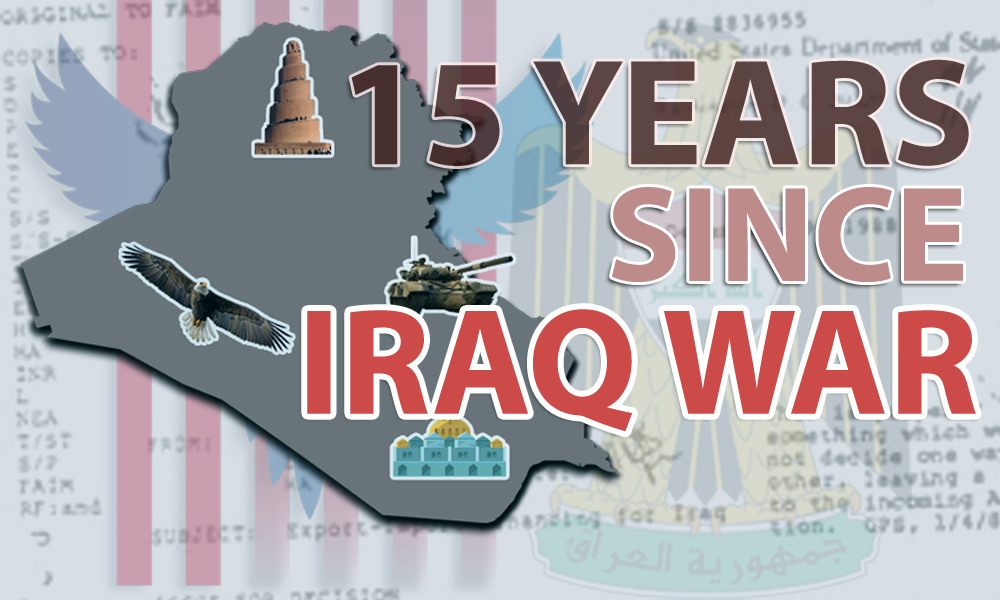This week marks 15 years of the US-led invasion of Iraq, which toppled the Ba’athist government of Saddam Hussein, changing Iraq and the Middle East, forever.
By Madhuvanthi Srinivasan
Bangalore, March 20, 2018: The Americans decided to invade Iraq to free the people of the country from the hands of tyranny and destroy the threat posed by the Saddam Hussein-led government to world peace. Iraq, however, stands at the brink of violence with waves of sectarianism, terrorism and political tensions pinning the country down to the ground.
The violence and conflict among the country’s Shiite, Sunni and Kurdish communities continue to greatly threaten the idea of an Iraqi state or Iraqi national identity. The people of Iraq do relate to a ‘national Iraqi identity’ irrespective of the community they belong to but the political discourse in the country, post-invasion, has been largely communal thus strengthening a communal narrative over national unity.
The process of nation building, after the departure of the US from Iraqi soil, has been particularly slow because of Baghdad’s disinterest in building an Iraq that would be inclusive. On the contrary, the leadership has clearly focused on communal interests and representation rather than bridging the gap between already divided communities. Unfortunately, Iraq is clearly divided, today.
The Americans and the British were successful in pulling Saddam out of a hole in Tikrit and executing him, however, they failed to contain the consequences of their actions in the country and the region, in general.
Sectarian tensions did exist during Saddam’s times but the Shiites, Sunnis and Kurdish communities of Iraq were relatively well integrated. Post-invasion, the Shiites took over the Iraqi leadership. Despite being the majority in the country, the Shiites were subject to discrimination and repressive policies under Saddam’s regime which resulted in a Shiite narrative of victimhood. With Shiites coming to power in Baghdad, especially under Nouri Al-Maliki, the Sunnis started feeling greatly marginalized, thus resulting in a Sunni narrative of victimhood.
Just like how the Shiites looked at Saddam’s army as a Sunni unit, the Sunnis look at Iraqi Security Forces or ISF as a Shiite unit. The ISF’s ‘anti-terrorism’ operations have largely been concentrated in and around Sunni areas. The ‘Sons of Iraq’ or the Sahwa (Awakening) movement initiated and sponsored by the US military intended to integrate tribal militias and former military personnel from Saddam’s security forces to reunite and fight the Al-Qaeda. Both, the Kurds and Baghdad were not clearly happy with this considering they feared a revival of Sunni supremacy in Iraq. With the withdrawal of the US troops, a lot of promises made to members of the movement were not kept. One of the most important among them was the lack of efforts on Nouri Al-Maliki’s part to integrate members of the Sahwa movement into the Iraqi Security Forces. The continued marginalization of the Sunnis served as a precursor for the formation of the Islamic State of Iraq. One of the biggest reasons why residents of cities like Mosul, Fallujah, and Ramadi (these are cities with greater Sunni concentration) accepted the violence of ISIS was because they chose to stay with the better of the evil.
The Kurds, though are Sunnis, relate to their Kurdish identity more than their sectarian identity. The Kurds and the Sunnis, in fact, have been at logger heads over places like Kirkuk. Also, the Kurds will possibly never forget the Halabja massacre where Saddam gassed thousands of Kurds to death in a single day. The Kurds strongly believe that they were never a part of Iraq and have severe trust issues with Baghdad.
The Kurdish referendum in September 2017, which was non- binding, had invited the wrath of Turkey, Syria, the Iraqi National Government, Iran and the European Union. An independent Kurdistan continues to threaten the existence of present-day Iraq and could potentially redraw borders in the Middle East. It is very important to note that the Kurds supported the Americans during the invasion in 2003 and continue to support American operations in Iraq and Syria to leverage support for their cause of an independent Kurdistan.
Iraq is gradually trying to pull itself together following the ouster of the Islamic State from the country and is hopeful of peace and change with the prospect of elections in May 2018. However, the US-led invasion invariably resulted only in deadly attacks on the Shiites by terrorist groups, the US-backed government’s inability to curb sectarian divisions, the looming threat of an independent Kurdistan, the Iraqi Security Forces’ operations against the Sunnis and everything that has made it difficult for the Iraqis to move on from the legacy of the invasion.




